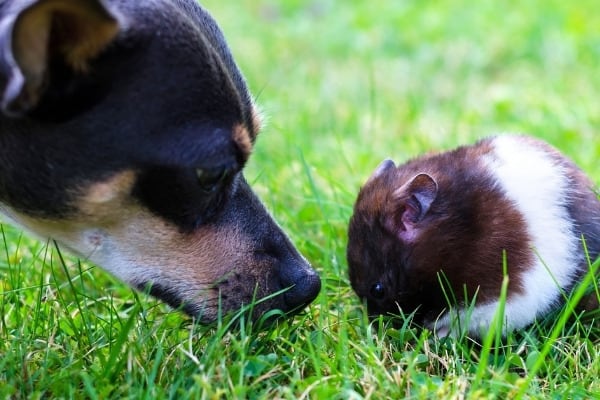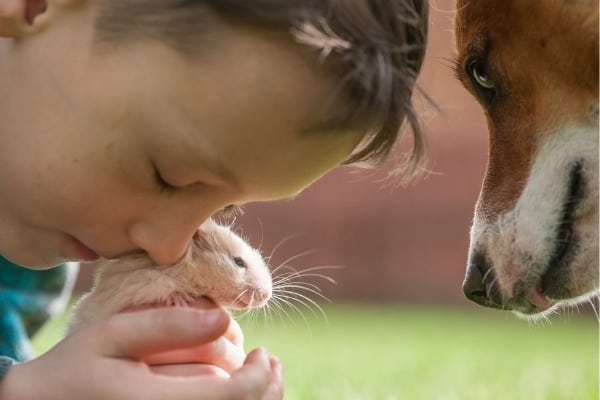
If you have a dog and a hamster, you may want them to become friends.
Some dogs and hamsters can get along, but it takes a lot of patience and time to get them to see each other as friends instead of predator and prey.
Do dogs eat hamsters? Dogs have a natural instinct to hunt, and hamsters are prey animals. Some dogs may not act aggressively toward hamsters or try to eat them, but others will. It’s best to introduce your dog and hamster slowly and never leave them alone together unsupervised.
If you have a dog and a hamster and want to introduce them to each other in hopes that they will become friends, read on to learn about how they may act around each other.
Dogs and Hamsters – What To Expect
Dogs are natural predators, and hamsters are natural prey. In most cases, when given the opportunity, dogs will chase and even eat hamsters.
Whether or not your dog tries to eat your hamster depends on the temperament and hunting instinct of the dog.
Do Dogs and Hamsters Get Along?
Some dogs and hamsters do get along. In most cases, the dog will want to chase or hunt the hamster, and the hamster will be scared and want to hide from the dog.
Introducing them to each other for a short time each day may help them adjust to each other and be more likely to get along.
Do Dogs Kill Hamsters?
Many dogs will kill a hamster if given a chance. Dogs see hamsters as prey, and even those who may not have an urge to kill may accidentally kill them by trying to play with them.
Some dogs may actually kill and eat hamsters.
Why a Dog Might Attack a Hamster
Dogs usually attack hamsters out of instinct. They have a natural drive to chase and hunt, and when they see small animals that they consider prey, those instincts may kick in.
Even the friendliest dogs may attack other small animals.
Factors That Will Affect How Your Dog Responds to the Hamster
While some dogs may tolerate hamsters and even be friendly toward them, there is always a chance that your dog may try to kill it.
There are many things that can determine how your dog responds to a hamster.
Breed of Dog
Some dogs are more likely to have a hunting instinct than others.
Dogs that are bred as hunting dogs or herding dogs are more likely to attack a hamster because they have been bred to naturally have a strong prey drive.
Amount and Quality of Training
Dogs that have been properly trained may not attack a hamster. Properly trained dogs have more self-control and may even look to their owner before they respond to the hamster at all.
They may also have a higher tolerance for other animals and better social skills.
Initial Introductions
The way you introduce the animals can have a big impact on how well they get along. You should make sure both animals are calm before you introduce them.
Keep the hamster a safe distance away from the dog while also allowing the dog to sniff the hamster.
Limit the interaction time, but increase it with each introduction. The animals may eventually get used to each other.
Proper Supervision
Even if the dog and hamster seem to get along, you should never leave them together unsupervised. A dog could easily harm or even kill a hamster in just a few seconds.
Always monitor the animals closely when they are interacting, and watch for any signs of aggression from your dog.
Socialization
Dogs that have grown up with other animals, especially other small animals, may be more likely to see a hamster as a friend instead of food.
This is just one reason why early socialization is so important.
Temperament
Some dogs are more aggressive than others or may show aggression toward other animals.
If your dog doesn’t get along with cats or other small dogs, he likely won’t get along with your hamster.

What Happens if a Dog Eats a Hamster?
If your dog eats a hamster, monitor him closely for the next 24 hours.
Hamsters are not toxic to dogs, but if your dog is not used to eating live animals, it may develop an upset stomach or other digestive issues.
Should your dog ever be around another small animal again, know that he is not to be trusted under any circumstance.
How To Protect Your Hamster From Your Dog
The best way to protect your hamster from your dog is to keep it in a cage and away from the dog.
If you want to let your hamster out to play or get some exercise, secure your dog in another room or a crate.
If you insist on keeping the two animals together, supervise them at all times, and remove the hamster if the dog shows any sign of aggression or begins to look at it as prey.
Related Questions:
How Do I Know If My Dog Ate My Hamster?
The only way to know for sure if your dog ate your hamster is to see it happen. Hamsters can escape easily, and because they are so small, they can hide easily.
If you suspect your dog ate your hamster, you may want to inspect his poop for signs of bones or fur, but these things may not always show up.
Are Hamsters Scared of Dogs?
Hamsters see dogs as predators, so most hamsters are scared of dogs.
If you introduce your hamster to your dog in slow spurts over a long period of time, your hamster may learn to tolerate the dog and not fear him as much.
Conclusion
Hamsters and dogs can become friends, but it is not always possible. Most dogs will see hamsters as prey and want to eat them.
Even those that aren’t aggressive may accidentally hurt or kill a hamster while playing with it.
If you plan to introduce these two animals, you will need to monitor them closely, and never leave them unsupervised.




![[Buyer's Guide] Dog Detangler Sprays That Actually Work! (2024) A Cavalier King Charles Spaniel lying on a woman's lap while being brushed.](https://www.trendingbreeds.com/wp-content/uploads/2020/11/Cavalier-King-Charles-Spaniel-and-brush-150x150.jpg)